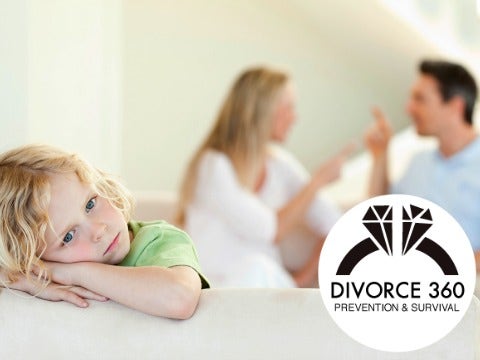'In It For The Kids': Terrible Reasons To Stay In A Bad Marriage
Are you guilting yourself into staying in a loveless marriage?

Why do some people stick in loveless marriages? Whether it's for the kids or it's just too hard to move on, love, relationship and parenting experts Deborah Chelette-Wilson and John Condron explore what makes people stay put... even if divorce is in everyone's best interest.
Condron reminds us that, although certain situations may seem obviously hopeless to us, there may be more going on behind the scenes: "The important thing to remember is that though others may label some or all of our reasons 'stupid', they have not lived our lives."
"The first and most obvious reason that comes to mind is 'for the sake of the children'. But the common wisdom on what is best for the children has shifted dramatically over the years. For example, until her own divorce in 1975, Ann Landers consistently advised couples to stay together for the sake of the children. Since then, it has become more common to hear that a 'good divorce' may be better for children than a bad marriage."
Chelette-Wilson adds that "For most people leaving a relationship, especially when children are involved, is not as easy as it sounds." There are many reasons one might rationalize a bad relationship for the sake of the kids, a common one being "I want my child to have a mother or father in their lives because I didn't."
If not for the kids, why else? Says Condron: "Some of us fall in love with a dream. That is, we see the partner for who he or she could be, rather than for the reality. We see flashes of the loving, caring person we know the partner to be 'deep down inside', and ignore the evidence of the sometimes awful person with whom we actually share our lives."
You might tell yourself, for example, says Chelette-Wilson, "He only gets drunk every now and then. He is good most of the time, so this must not be hurting the children."
Both experts agree that apathy or fear over the sheer amount of effort a divorce requires might be stopping unhappy couples from splitting. According to Chelette-Wilson, couples may avoid divorce because they think things like "I don't want to go through a divorce or another divorce", "I don't have the money for an attorney", or "My family tells me I made my bed now I have to stay in it".
Says Condron, "Some are held in place by a form of inertia. Many people continue in unsatisfying relationships for months, years or even decades because they lack the energy or motivation to strive for something better. They prefer the uncomfortable known to the frightening unknown. They might even give up on the idea of a better life. A very specific form of inertia is 'learned helplessness.' People learn that no matter what they do, the situation never changes. Strategies that used to work don't anymore. They become increasingly isolated, spending less and less time with friends and family. They give up, don't even try new strategies that might work, and end up feeling hopeless and helpless."
A sense of obligation can also keep you stuck. According to Condron, "Some people stay because 'it's the right thing to do', or because breaking up would be embarrassing. Ironically, children of divorce tend to give up on relationships faster because their parents didn't model appropriate strategies for managing conflict. This may leave them trapped in a relationship on which they have given up but are unwilling to end."
Chelette-Wilson explains that religion can dictate your choices, too: many people stay in bad relationships because they have a sense of spiritual or cultural obligation. She explains that some people also think "No one in my family has ever gotten a divorce. I don't want to be the first."
Fear is also a powerful motivator. Chelette-Wilson says some of the most common anxieties over leaving a marriage are: "I don't have the skills to make enough money to take care of me and my children", "No one else will love me" or "I can't live without him or her."
Condron echoes that: "Many of us stay in unsatisfying relationships because we are afraid we can do no better, or that a bad relationship is what we deserve. We might think we are too old, too young, too fat, too plain, too skinny, too tall, too short, too… the list goes on forever."
Says Chelette-Wilson: "We have been created to need to attach to others life-long not just in childhood. What we see modeled by our parents and significant family members become our foundational beliefs about love and relationship. Our cultural beliefs and experiences add to that template. By the time we are adults we have a mixed bag of beliefs about what love is and isn't and how to have and leave a relationship."
Condron continues: "None of these are good reasons to remain in a relationship. A healthy relationship should be mutually beneficial. It should meet at least some of the needs of each party. It should not be harmful to either party. We should not expect to be happy all the time, and should remember that another person cannot make us happy, but if we are unhappy most of the time, it may be time for a change!"
Lastly, says Chelette-Wilson: "These beliefs have a sliver of truth but not all of it. It takes a brave soul to take responsibility for his or her part in a relationship, and to make positive changes. Otherwise they perpetuate the same patterns to their children that have led them to a loveless marriage. Surely both you and your children deserve to live a life full of love and joy. Who will show them if you don't?"
More marriage advice from Yourtango:
